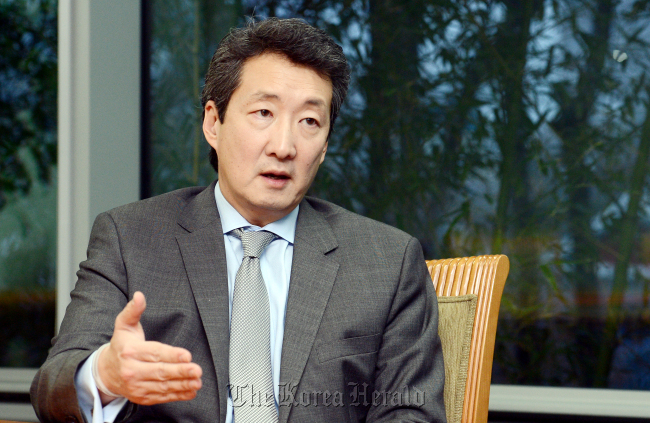Seoul’s new initiatives key to North Korea standoff: Cha
By Shin Hyon-heePublished : Jan. 23, 2013 - 20:38
South Korea should be in the driver’s seat in future multinational efforts to resolve tensions over North Korea’s nuclear programs, and incoming President Park Geun-hye’s new approach to build trust and resume exchanges with Pyongyang could play a key role in moving ahead in the process, said Victor Cha, a U.S. Northeast Asia security expert.
The U.N. Security Council approved a resolution Tuesday to condemn the North and toughen sanctions in response to its Dec. 12 rocket launch. The North responded with a hint at a third nuclear test.
Despite growing uncertainty surrounding its next steps, Park’s “trustpolitik” strategy may bring a new turn in the cross-border standoff and regional dynamics, the Korea chair at the Center for Strategic and International Studies said in an interview with The Korea Herald.
“I think the lead player in all this is South Korea, because you have a new government coming in here and a new policy toward North Korea,” said Cha.
The U.N. Security Council approved a resolution Tuesday to condemn the North and toughen sanctions in response to its Dec. 12 rocket launch. The North responded with a hint at a third nuclear test.
Despite growing uncertainty surrounding its next steps, Park’s “trustpolitik” strategy may bring a new turn in the cross-border standoff and regional dynamics, the Korea chair at the Center for Strategic and International Studies said in an interview with The Korea Herald.
“I think the lead player in all this is South Korea, because you have a new government coming in here and a new policy toward North Korea,” said Cha.

“What everybody will be watching will be to see how she builds that trust. I think it’s a good point to put out there because if you have a president of South Korea that says trust is important, it will cause other countries to say, ‘How do I build trust?’”
Cha is a prominent Korea specialist and Asian studies professor at Georgetown University in the U.S. He served the George W. Bush administration from 2004-07 as director for Asian affairs on the White House’s National Security Council.
He was in Seoul to attend a seminar on Korean unification hosted by the Asan Institute for Policy Studies, the Washington-based CSIS and the Korean Studies Institute at the University of Southern California.
At a news conference on Tuesday, he acknowledged that the U.S.’ “strategic patience” policy has made little progress in taming the North’s nuclear ambitions.
“I think everybody was left frustrated because for 25 years, diplomacy has been unsuccessful,” Cha said.
“Strategic patience, strategic comma or whatever it might be is not working because strategic patience has just allowed North Korea to patiently develop their nuclear programs and missile programs. So we have to do something else.”
While the North’s attitude will remain the single most decisive factor, Cha emphasized the need for close policy coordination between South Korea and the U.S.
“I don’t think that you’ll see any major new initiatives from Obama on North Korea. But I think you could see new initiatives from Park,” he said.
“So the key will be for Washington to stay closely connected with whatever Seoul might do.”
On China, Seoul’s push for a bilateral free trade agreement may be a good long-term strategy to prompt Beijing’s “reevaluation of its equities” on the peninsula, Cha said.
“Perhaps doing things like that, that emphasizes the China-South Korea relationship, is the best way to try to influence the way China thinks about North Korea,” he added.
Park has reaffirmed that she would not tolerate the North’s nuclear development. But she also promised to engage in dialogue with its leadership and offer unconditional humanitarian aid.
Despite Washington’s relative aloofness, Cha ruled out the possibility for any discord between the two allies, citing active diplomacy between ranking officials.
Glyn Davies, U.S. special representative for North Korea policy, arrived in Seoul on Wednesday to meet with Park’s transition team, his counterpart here Lim Sung-nam, Unification Minister Yu Woo-ik and other executives.
Kurt Campbell, U.S. assistant secretary of state for East Asian and Pacific affairs, was here last week along with four other officials.
“I think she’s balanced about these sorts of things. I’m not worried that Korea is going to go off, do something drastic and surprise everybody,” he said.
In line with Park’s “trustpolitik” mantra, Cha stressed the importance of trust between Asian countries given the volatile security environment and volatile territorial and historical brawls.
“She’s right in the sense that particularly in Asia, a lot of foreign relations are about trust, not just about interests. In the West, it’s about interests. But in Asia, it’s about interests and trust,” he said.
By Shin Hyon-hee (heeshin@heraldcorp.com)


















